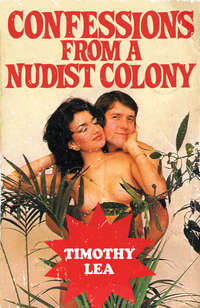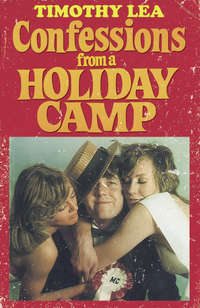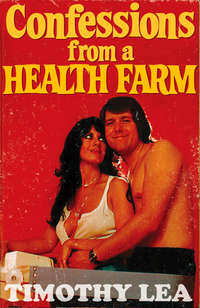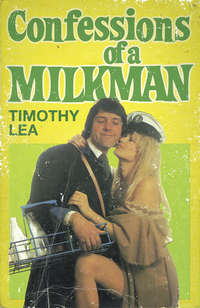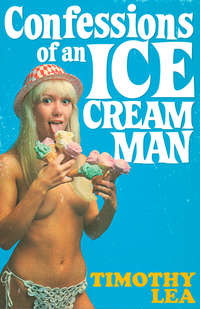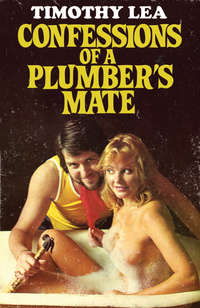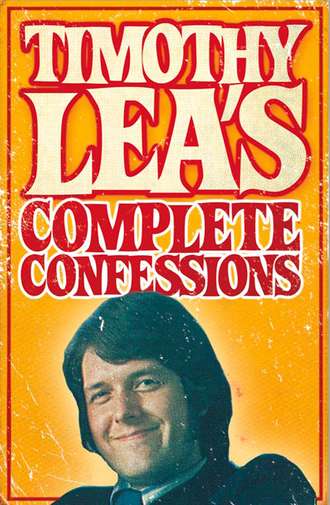
Полная версия
Timothy Lea's Complete Confessions
Dad and Doctor Murdoch would make a wonderful comedy team, and I’m wondering what Hughie Green’s telephone number is when Mum chips in.
“Do leave him alone, Dad, he’s told you enough times what happened.”
“Oh, yes, Mother. I know all that. He was stretched out on the roof, wasn’t he, having a little sunbathe. Then this bloke opens a window, dislodges the ladder. Timmy grabs at it, slips, loses his balance and does a swallow dive into the street. Sounds very likely, doesn’t it?”
“I really can’t be bothered—” I begin.
“I suppose that bird got a black eye when you landed on top of her?”
“I wonder what your excuse is going to be, Dad?”
“Don’t adopt that tone with me, Sonny Jim. I could still teach you a few lessons if it came to the pinch.”
“Well, prove it, or shut up.”
I mean it, too. Every few weeks or it is probably days now, Dad and I are squaring up to each other and sooner or later I am going to dot the stupid old bugger one. Nothing happens this time because mum throws a tantrum and sister Rosie arrives with little Jason.
“I can’t stand it, I can’t stand it,” Mum is wailing when little dribble jaws shoves his jam-stained mug round the door and her mood changes faster than a bloke finding that the large lump in the middle of his new cement path is his mother-in-law.
“Hello darling,” she coos. “Who’s come to see his Grand-mummy, then? Ooh, and what a nasty runny nose we’ve got. Doesn’t naughty mummy give you your lovely cod liver oil, then?”
Honestly, Rosie must feel like belting her sometimes. She still exists in a world of cod liver oil, cascara and milk of magnesia. Open your bowels and live might be her motto.
Mum and Rosie go rabbiting on and little Jason rubs his filthy fingers all over the moquette. Just like old times. I haven’t had a chance to tell anyone about my problem, and nobody would be interested, anyway.
“How are the lessons going, dear?” says Mum.
“Oh, smashing Mum. I’ve got this lovely fellah. Very refined, lovely even white teeth. I think they’re his own. You know what I mean?”
Mum shakes her head vigorously. “Yes dear, some of them are very nice. I’ve thought about learning myself, but your father will never get one.”
What are they on about? I’ve never known Rosie to acknowledge the existence of any other bloke than Sid.
“He’s ever so gentlemanly and he never shouts at me. Everything is very smooth and relaxed.”
“That’s the secret, dear,” agrees Mum. “If you were doing it with Sid he would probably start getting at you. I’m told you never want to take lessons with your husband. Can you imagine what your father would be like?”
They nod enthusiastically.
“Bloody marvellous, isn’t it?” says Dad, letting me in on the secret. “For thirty years I struggle and sweat to support a family and never even sniff a motor car. Now every bleeder has one and your mother starts saying she wants to take driving lessons.”
“Yes Dad.”
I’m not really listening because suddenly I’ve got this feeling that fate—or whatever you like to call it—is trying to tell me something. Become a driving instructor! Why hadn’t I thought of that before? It would be ideal. I can’t hop about on my leg too much and as an instructor I’d be sitting on my arse most of the time, telling some bird to turn left at the next traffic lights. It would be a doddle. And what opportunities to exploit my natural talents! If Mum and Rosie could be aroused, just imagine the effect on a normal red-blooded woman! I’d seen all those ads and tele commercials—that’s where they had got the idea from. Tight-lipped, hawk-eyed young men ruthlessly thrusting home gear leavers with wristy nonchalance whilst, open-mouthed x-certificate “yes please” girls lapped up every orgasmic gesture. It was a wonder a bird could look at a gear stick without blushing. And the whole operation had so much more class than window cleaning. I’d seen them with their leather-patched hacking jackets, nonchalantly drumming their fingers against the side of the window. “Very good, Mrs. Smithers. You really are beginning to make progress. Now let’s pull off on the left here, and I’ll ask you a few questions about the Highway Code—”
“Oh Mr. Lea—”
“Careful, Mrs. Smithers, you’re drooling all over my chukka boots.”
I can see it as clearly as Ted Heath’s teeth. An endless procession of upside-down footprints on the dashboard.
Are you the guy that’s been a pushin’
Leaving greasemarks on the cushion
And footprints on the dashboard upside down
Since you’ve been at our Nelly,
She’s got pains down in her belly,
I guess you’d best be moving out of town.
That’s the way Potter the Poet tells it and that’s the way I can see it.
The rest of the day is background music and the next morning I am round at Battersea Public Library which is the source of all knowledge to the lower orders. I had been simple enough to imagine that you just slapped a sign saying “LEArn with LEA” on your car and you were away. But, oh dear me, no. Not by a long chalk. The lady with a frizzy bun and indelible pencil all round her unpretty lips soon throws a bucket of cold water over that one.
“You’ll have to write to the Department of the Environment,” she says coldly. Me writing to the Department of the Environment! I mean, it sounds so grand I hardly feel I have a right to. Maybe I should chuck it all in and get a job on the buses. But I do as she says and soon receive an AD154 (an official paid buff envelope which Dad snitches to send off his pools), an AD12, an AD13, and AD1 3L, two AD14’s and an AD1 14 (revised). My cup overfloweth. After poring over this lot till my eyes ache I work out that I have to get on the Register of Approved Driving Instructors and that to do this I have to pass a written and a practical examination. I will then be a—wait for it—“Department of the Environment Approved Driving Instructor” and you can’t get much higher than that, can you? D.E.A.D.I.—oh well, I suppose they know what they are doing.
Filling in the application form is a bit of a drag because there is a section about convictions for non-motoring offences and a request for the names of two people prepared to give references. I decide to come clean on the lead-stripping because, on the application form, they give you four lines for details of your offences and tell you to continue on a separate sheet if necessary, so they must be used to getting some right rogues. My criminal record will fit into half a line.
The references are more of a problem because you can’t use family (not that anyone, apart from Mum, would have a good word for me) and I am not on close terms with anyone else in S.W.12. In the end I make up a couple of names and give my sister’s address for one, and a block of flats where I know the caretaker for the other. Both of them get instructions to hang on to any mail addressed to the Rev. Trubshawe or Lieut.-Colonel Phillips R.A. and sure enough, both of them get a letter asking for a character reference.
I am dead cunning with my replies, even getting the Rev. Trubshawe to allude to my schoolboy indiscretion: “no doubt accounted for by his having strayed into the company of the wrong sort of boy”, whilst the colonel says I am a “damn fine type”. My little ruse seems to work because two weeks later I get a receipt for my £5 examination admission fee and am told where to report.
The first examination is the written one and I mug up all the guff they give me so I see road signs every time I close my eyes. I have never worked so hard in my life and I feel really confident that I’m going to do well. But—and that is one of the key words in my life—once again fate puts the mockers on me. This time it is in the crutch-swelling shape of the eldest Ngobla girl Matilda. The Ngoblas are our next door neighbours and, as their name suggests, are blacker than the inside of a lump of coal. Mum and Dad are very cool about it and would never admit to anything as unsavoury as racial prejudice but the Ngoblas are not on our Christmas card list and when Mum smiles at Mrs. Ngobla it’s like Sonny Liston trying to tell his opponent something as they touch gloves. For myself, I am not very fussed either way but I don’t have much to do with the Ngoblas, basically, I suppose, because I never have done.
My encounter with Matilda takes place when I am revising on the eve of my examination. Mum has gone to the bingo and Dad is at the boozer so I have the kitchen to myself and am reading “Driving” for the four hundred and thirty second time when I look out of the window and see Matilda prancing about on the lawn (which is what Dad calls the patch of dandelions by the dustbins). She has just achieved that instant transformation from schoolgirl to woman and with her pink woolly sweater and velvet hot-pants she looks decidedly fanciable. I can hardly believe that when I last saw her she was wearing a grubby gymslip and dragging a satchel behind her. It turns out that one of her kid brothers—there are about 400 of them—has lost his ball over the wall and I help her look for it whilst flashing some of the small talk that has made me the toast of Wimbledon Palais. I am glad to find, when she bends over an old chicken coop, that there isn’t a drop of prejudice in me. In fact, quite the reverse. I could board her, no trouble at all. She looks as if she has been poured into a black rubber mould and the sight is enough to give Mr. Dunlop a few ideas for new products, I can tell you.
I persuade her to pop inside for a quick drink (tea or coffee) and—well, you know what it is like—one thing leads to another and I’ve got her hot pants off before you can say Enoch Powell. A few moments later, we are wearing out the pile on the fireside rug when Dad comes in. He must have crept across the hall on tiptoe, the nosey old sod. He goes spare and starts rambling on about “your mother’s home” and “blackamoors”, “thin end of the wedge” etc., until I nearly go out of my mind. No sooner has he belted up than Mum comes in to hear the whole story and start blaming herself for leaving me alone for a couple of hours just as if I was still a schoolkid. Matilda stalks out with her head in the air right at the beginning and, I must say, I have to hand it to her.
“Ooh, the hussy,” squeals Mum, “can’t you see, it’s a conspiracy. They’ve been trying to lure you for years. Give themselves a bit of respectability. You mark my words, that black trollop will be saying you made her pregnant.”
“She’ll be dead lucky,” I say. “Dad put the kibosh on that.”
“Shut your mouth, you dirty little bleeder,” howls Dad.
It’s all pretty turgid, and when I tell Dad he is jealous and I have watched him giving Mrs. Ngobla the eye for years, he goes stark raving bonkers.
“Get out of this house!” he rages. “Get out! Get out! Get out!”
So I do. Straight out of the front door, slamming it behind so the whole terrace sways. And that is the start of one of the worst nights of my life. I am not going back, oh no, not me! But where am I going? Rosie seems a good bet, even if I do have to throw myself on Sid’s mercy, but I find that they have gone to Hastings for the week.
When I think about it, I’ve got the same problem I had when I was looking for a reference. No friends. I end up sleeping, if that is the right word, in one of the tennis court huts on Clapham Common, and I have to hang around there for an hour until the last pair of lovers vacate it. It is bloody cold and I think I still have the pattern of the benches stamped on my shoulder blades. When I eventually drop off it is only onto the floor and then it starts raining so I give up the whole idea of sleep and huddle in the darkness until it begins to get light.
The result of this is that by the time I get to the examination, I am totally knackered and can hardly keep my eyes open. I am not looking my best, either because pride has prevented me from returning to the family home and velvet jeans and a Mr. Freedom T-shirt are a trifle conscipuous amongst the selection of sports jackets set off by the occasional Burton masterpiece.
We have one hour and twenty minutes for the first two papers and by a superhuman effort I manage to keep my eyes open most of the time, though it is fatal if I prop my head on a hand. My habit of jumping out of my seat and taking violent swings at the empty air causes a little surprise though, as does the occasional slap round the chops I administer to myself.
We have a break before the second examination and I nip across the road for some tea and a couple of ham rolls. Trouble is I’ve no sooner sat down than I fall asleep and all the other buggers have been working for fifteen minutes when I come stumbling through the door. I try and settle down but it’s hopeless. Every question I read about five times and I can’t take in the words. I start writing and my mind drifts off into cotton wool and I forget what I was about. Then I make the mistake of thinking that if I could just take a little cat nap I would awake refreshed and be able to dash off the papers in half an hour. The next thing I remember is the examiner tugging my papers from under my head and the trail of saliva running down the desk and on to the floor. My paper has my number on it, the question number and “The interpretation of the reason for failure”. That is all. I could weep.
But of course, I don’t. I drag myself home and go straight to bed, ignoring Mum who is glad to see me, but damned if she is going to show it too much. It’s a funny thing but though I am still flaked out I can’t sleep. I just lie there thinking how I have blown the exam and how bloody unfair it is. After a while, I get up and go through all my AD12 and AD13s to see if and when I can take it again. Three months it says.
Three months! That is a bloody long time; especially now that I have vowed to get out of Scraggs Road just as fast as my tiny legs will carry me.
I pore over my papers and discover a faint ray of hope. I can get a “Licence to give Instruction” which would allow me to do just that whilst I am waiting to take the written exam again. Trouble is, that for at least one-fifth of the time I’m on the road I have to be supervised by an A.D.I. so that means finding a driving school that will accept me as a trainee. LEArn with LEA will have to wait for a bit.
Slightly cheered I pad round the local schools but not a sausage. They are all one man bands, fully staffed or “we only take fully qualified people” said with withering contempt.
So there I am again, on the scrap heap at 22. Stuck between the Devil and the Deep Black Ngoblas for another three months. Dad is, of course, not at all surprised by my failure to pass the exam and the verbal war between us festers unpleasantly with Mum flapping miserably on the side lines. The situation is intolerable, as my old schoolmaster used to say, and I keep out of the house as much as I can. “You use this place like a hotel,” moans Dad, who would start belly-aching about me always being under his feet if I watched five minutes of Coronation Street! It is at this time of frustration and bitterness that help arrives from an unexpected quarter.
I am having a solitary drink in the public bar of the Highwayman when I see Sid in the saloon. At first we pretend not to see each other but then, when I am sitting down thinking how stupid it is and on the point of going over and buying him a beer, he comes in and buys me one. I tell him my problems and he nods sympathetically.
“You want a driving school, eh?” he says. “Funny that, but I just might be able to help you. Bloke I knew in the army runs a driving school. Did I ever tell you about B.S.M. Cronk?”
“Cronk?! That’s a funny name!”
“Yeah. Battery Sergeant Major Cronk. He was the herbert who got me chucked out, bless him.”
Sid had done his national service, which shows you how old he is, and been dishonourably discharged after getting involved in some petrol fiddle. I could never understand the details and Sid swore that he was innocent—not that that meant anything. When he was caught red-handed in a fur warehouse he said he had heard a cat mewing, climbed in to let it out, and picked up the wrong fur in the darkness.
“I had a letter from him afterwards saying that it had all come out and that they now knew I was innocent. I said ‘forget it’ in case they took me back in again. I remember at the time thinking that it was good of the old bugger to write to me.”
“What’s all this got to do with me?” I say, because Sid can go on a bit once he starts his army reminiscences.
“Well,” says Sid, “he owes me a favour; said as much in his letter. I reckon if I dropped him a line and reminded him, he might see you alright.”
“Where is this school?” I ask.
“I dunno. Place called Cromingham, I think. Somewhere in Norfolk.”
“Norfolk! Bloody heck. It’s not exactly round the corner, is it?”
“No, but I believe it’s very nice up there. Very good air, your Mum always used to say. She went up there for her honeymoon, didn’t she?”
“I don’t know where she went. Look, I don’t know if I want to go all that way. It’s flat as a pancake, isn’t it, and there’s nothing there but a load of swede-bashers. What am I going to do in the evenings?”
“What do you mean? It’s a seaside resort, isn’t it? The place will be crawling with birds. It’ll be like a permanent holiday.”
“But it’s November, Sid.”
“Well, all the local birds will be dying for a bit of spare, won’t they? I went to Rhyl in October once and all the local tarts who wouldn’t have looked at you in the holiday season were roaming the streets in packs.”
“I’d have thought they’d have been better off out of season because their blokes weren’t knocking off all the new birds.”
“It works both ways. By Christ, but you’re hard to please. You don’t just look a gift horse in the mouth, you kick its bleeding teeth down its throat.”
“You’ve got a vested interest in seeing me out of the way, Sid. You can’t blame me for being cautious.”
And so we go on until I agree that he should write to Cronk and lend me two quid, the latter negotiation being a bit more difficult to effect than the former. A week later a very official looking letter arrives with “The East Coast Driving School” tattooed all over it. It is from Walter Cronk, Managing Director and Chief Instructor, and informs me curtly that the writer has reason to believe that I wish to become a licensed instructor at the above-named establishment and would be grateful for my verification of this fact and a statement of my availability. I write back saying that my availability is immediate and receive what Mr. Cronk calls a movement order, stating that upon acceptance of my application for a licence to give instruction in the driving of a motor car, provision will be made for me to board with a Mrs. Bendon at 17 Ocean Approach, and will I inform her and the E.C.D.S. of my intended date and time of arrival. Mr. Cronk, or someone, has also thoughtfully enclosed a postcard of the Esplanade at Cromingham which looks not unlike the Esplanade of 132 other resorts, though achieving a certain distinction by the quality of the colour register which is such as to give the effect of a 3D film seen without glasses.
I make my arrangements quietly and secretly and can then achieve total surprise and discomfiture when I announce that I am pushing off. Mum can’t believe it and even Dad looks a trifle cast down. The night before I go he takes me out for a drink, which is totally unheard of, and hardly says anything the whole evening, which is likewise.
“Good luck, boy,” he says, squeezing my arm as we say goodnight. “I’ll miss you.” I think the miserable old sod really meant it.
The next morning I take my sandwiches which Mum has wrapped in grease-proof paper, refuse her tomatoes because I know they will get squashed, and stride off to Clapham South tube station.
It’s funny, but now that I’ve fixed everything, I don’t want to go.
CHAPTER THREE
I change trains at Norwich and up till then the landscape has been flatter than a witch’s tit. After that it is flatter. Ploughed fields stretch away to the horizon and there are occasional lines of straggling trees pinning down the hedgerows. Farm buildings glint from behind the trees but they seem outnumbered by church towers. There must be one for every man, woman and child in Norfolk. Above all looms the sky, totally dominating the earth, the clouds sweeping in like waves on a vast and deserted beach.
The effect on me is depressing. Without a few houses around I feel as exposed as a spare prick at a whore’s wedding and there is something about the increasingly bare landscape and slow unhurried progress of the train that makes me feel I am coming to the edge of the world. Now the fields give way to marshes, pock-marked by brackish pools, and the trees disappear. Soon, I think to myself, the marsh will disappear and we will continue over, into and under the sea without anyone making a move to save himself. We are on the train of the doomed! (It just shows what watching all those late-night horror movies can do to your imagination.) I had hoped that the trip would be enlivened by the presence of a nymphomaniac lady of quality going up to visit her titled husband who had been paralysed from the waist down in a car accident. Unfortunately, once again we seem to have got on different trains and I am forced to blunt my imagination on hordes of yacking schoolgirls who invade the train as it approaches Cromingham. If not desirable, they are at least reassuringly not of the spirit world.
“So I says to ’im, git you your ‘ands off my knicks,” says one of them enthusiastically to a friend in an accent I can hardly understand. With them chattering like starlings and increasing evidence that man has contributed to the landscape, I begin to cheer up and look out hopefully towards the sea. I have been a few times with Mum—day trips to Brighton, Eastbourne and Hastings when I was a kid—and I remember the kick I used to get when I suddenly realised that the great blue line running along the horizon was the sea. Unfortunately, today it is a great grey line and what I see through a sudden dip in the landscape is barely distinguishable from the sky. I know Cromingham is next because British Railways have thoughtfully provided a map to which someone has added a piece of chewing gum and the word ‘dump’ next to my destination; no doubt one of my fellow-travellers who is now confiding to a local friend that one Clint Seago, fortunate owner of a Honda motor bike, “be a bit of all right”.
The marsh gives way to dry land again, thus ending my last fears, and buildings begin to appear beside the track as the brakes slam on. I notice that the trees cower away from the sea and their topmost branches are twisted in on themselves like the arms of a beaten boxer trying to protect himself from a hail of blows. When I flick the sandwich crumbs off my lap and struggle out onto the platform I can see why. The wind has an edge on it like a razor and must have been gathering speed ever since it left Norway. I can understand why all the locals scuttle off at an angle of 45º to the vertical. Also why their skins are tanned a kind of golden brown not far short of mahogany. You don’t have to breathe here. Just open your mouth and let the wind rush through every hole in your body.
When I get to the station entrance it is in time to see what I imagine is the only taxi in East Anglia disappearing inland and the last schoolgirl paddling away down the hill towards the town. An inquiry about buses is met with the same puzzled amazement that might have greeted a request for a camel.
I eventually manage to ring for another taxi and settle down to wait, looking over the rows of flint-studded cottages to where clumps of caravans sprout along the cliffs like toadstools. Very few of them seem to be occupied and I’m not surprised. You could freeze to death up there if this weather is anything to go by.
All in all, speaking my mind, and not mincing my words, the place has about as much appeal as an old age pensioners’ nudist camp and I’m seriously considering catching the next train home when my taxi arrives. The driver takes one look at my Hardy Amies original and has me summed up immediately.


